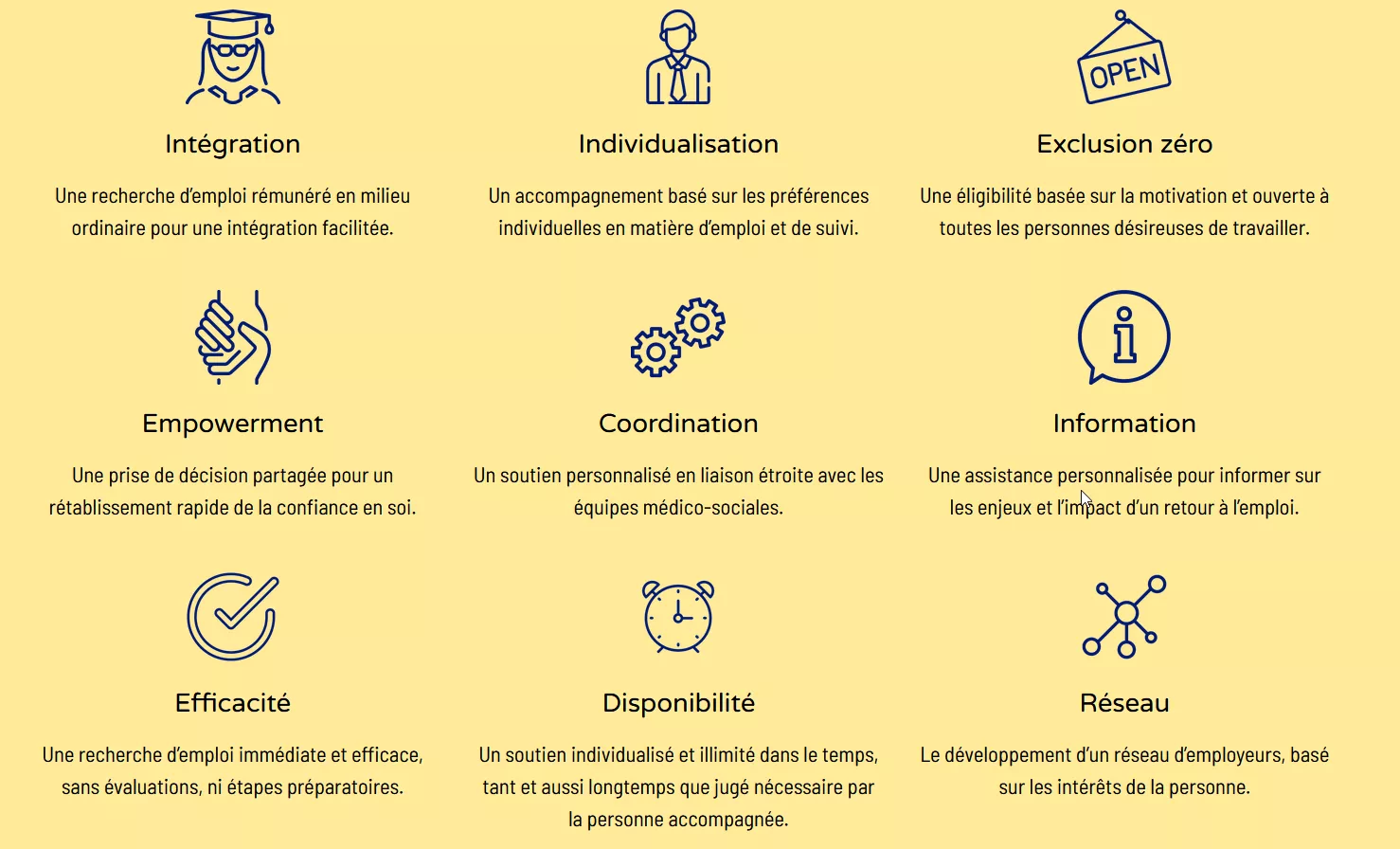Support towards employment and recovery-oriented practices!

[Translation : EPALE France]
Did you say inclusion?
To start with, I invite you to write down three things that are really important to you. Imagine that you give this paper to someone. A few moments later, this person returns it to you, having removed one of the things. How do you react?
This was the beginning of the Individual Placement and Support (IPS) training. No, social workers and health professionals are not monsters. We are not questioning their commitment, professionalism and benevolence. The aim of this exercise was simply to show the sometimes detrimental effects of care and support on beneficiaries/users.
“Paradoxically, it is when we act freely, for the sake of the action itself rather than for ulterior motives, that we learn to become more than what we were” [1].
[1] Mihaly Csikszentmihalyi “Vivre: la psychologie du bonheur”, 2006. p.377
The author of this sentence is none other than Mihaly Csikszentmihalyi, a Hungarian psychologist considered to be one of the founding fathers of positive psychology. In 2004 his research showed that the possibility to carry out freely chosen and goal-oriented activities was one of the main sources of well-being.
Unconditional focus on the person's preferences is one of the pillars of the Individual Placement and Support (IPS) method.
Where does it come from?
The IPS approach originated in the late 1970s in North America in the context of supported employment. The aim was to help people with an intellectual or mental disability to integrate into the mainstream working world. Recognised in the 1980s in US legislation, supported employment was theorised by social worker Deborah Becker and Dr Robert Drake in 1993 and 1998 with the IPS method.
In France, the association WorkingFirst13 deployed the IPS method in 2014 in Marseille for the first time.
A paradigm shift!
Beyond the principle of respecting the person's preferences, the method moves away from the paradigm of "train then place" to its opposite, "place then train”. Removing barriers is not an issue.
The 9 principles of the IPS method

In concrete terms!
WORKING FIRST, based on the IPS method, is a job coaching programme for individuals and companies. It offers intensive, individualised and time-limited follow-up to access and maintain employment in the mainstream labour market.
Originally, the method was intended for people experiencing psychological suffering who expressed a desire to work. Today, the challenge is to apply this method to people in vulnerable situations: putting them at the centre of their choices and pathways to encourage a rapid return to employment.
Services for people
The programme is open to all adults who want to enter the mainstream labour market.
Objectives:
· Increasing the chances of finding a paid job, in line with the person's preferences
· Developing relationships with employers;
· Supporting preparation and accompanying the employment contacts (job centre, temporary employment agencies, etc.);
· Demonstrating and explaining the labour market;
· Supporting the person in employment.
A free, personalised service for companies
A business-oriented model. Multi-reference work facilitates:
· support/assistance in recruitment
· personalised follow-up in the company: maintenance and adaptation of posts
· Training/awareness-raising on well-being in the workplace
But does it work?
In 2014, Bernard Pachoud [1] noted that the so-called "supported employment" model is distinguished by its superior effectiveness: the vast majority of comparative studies (randomised controlled) recognise it as having a rate of integration into the ordinary working environment that is at least twice as high as that obtained by traditional reintegration support practices for these people.[2].
This method of employment support has been conceptualised, modelled and evaluated through comparative studies which have recognised its real effectiveness: more than 60% of the people supported find a job in an ordinary environment compared to other methods. In Europe, the average employment rate with the IPS method is 47%. In the Working First team, the return to employment rate was 56% in 2018.
Some resources for more information
1. The website of the association "Working First" and detailed presentation of the job coaching scheme : https://workingfirst.fr/
2. Deborah R. Becker and Robert E. Drake; « A Working Life for People with Severe Mental Illness" , Oxford University Press. 2003. 232p.
3. Anke Boone "Etude qualitative de la vision des prestataires de soins et des experts du vécu sur le modèle Invidual Placement and support". Université Catholique de Louvain, 2020, 50p. https://socialsecuritypr.belgium.be/sites/default/files/content/docs/fr/publications/rbss/2019/rbss-2019-3-retour-a-l-emploi-avec-une-vulnerabilite-psychique-etude-qualitative-vision-prestataires-de-soins-et-experts-vecu-sur-le-modele-individual-placement-support-ips-fr.pdf
[1] Professeur de psychopathologie, directeur de recherches à l’Université Paris Diderot
[2] Pachoud Bernard, « Soutien à l'emploi, emploi accompagné et handicap psychique : une pratique nouvelle ? », Pratiques en santé mentale, 2014/3 (60e année), p. 13-16. DOI : 10.3917/psm.143.0013. URL : https://www.cairn.info/revue-pratique-en-sante-mentale-2014-3-page-13.h…





We need more job coaching…
We need more job coaching programmes like WORKING FIRST! Well done :)